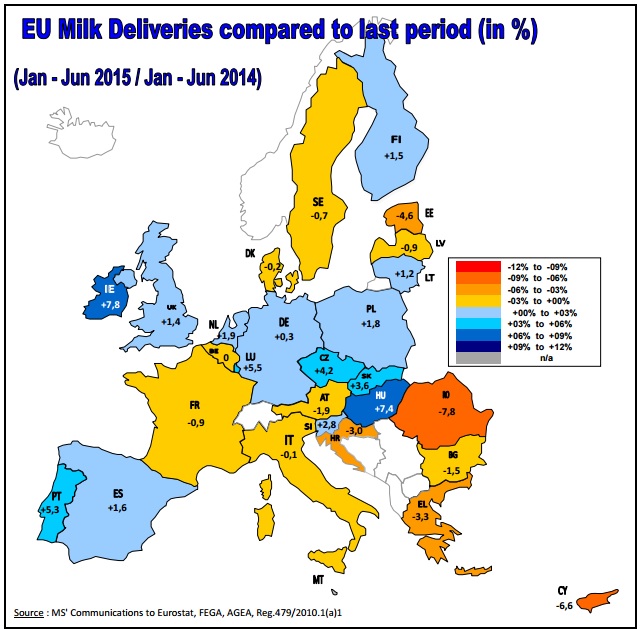New figures looking at EU milk production for January to June show that 7.8% more milk was collected in Ireland for the first six months of the year, compared to the same time last year.
Some 850,000t of Irish milk was collected as of June 2015 compared to the 750,000t collected as of June 2014.
Milk deliveries from January to March of 2015 were on a par with those of 2014, however the amount of milk collected in April, post-quota, then began to climb and peaked in May 2015 at 900,000t.

Looking at the overall EU figures, there was a 0.8% increase in cows’ milk collected. Like Ireland, the amount of milk collected peaked in May, at approximately 14m tonnes.
This then declined in June to approximately 13.5m tonnes, the figures show.
Comparing January to June of 2014 with the figures from the 2015 period, Ireland has had the highest amount of milk deliveries with a 7.8% increase.
Denmark, who in 2013 produced around the same amount of milk as Ireland (5m tonnes), had 0.2% less milk collected in January to June 2015 compared with the same time in 2014.
Hungary had the next highest number of milk deliveries with an increase of 7.4%, followed by Luxembourg with an increase of 5.5% and Portugal with an increase of 5.3%.
The UK has only seen an increase of 1.4% in milk deliveries comparing year-on-year figures.
On the other side of things, Romania has seen a decrease of 7.8% in milk collections, Cyprus has seen a decline in 6.6% and Estonia 4.6%.
Since quotas went earlier this year production has increased which, coupled with the Russian ban and other factors has seen an over-supply of milk on the market.
However, the industry has been actively embracing European Union efforts to take product off the market, through its storage plans – Private Storage Aid and Intervention, ASB Bank in New Zealand said.
Currently, it said that more than 130,000t of butter and nearly 50,000t of skimmed milk powder (SMP) are in Private Storage, with nearly 25% of that amount entering the program since the start of July. Intervention stocks remain reasonably low – 6,000t of SMP.
According to the bank, the challenge for the EU is similar to that faced by any government program that takes product off the market to keep prices high.
Eventually, the product needs to re-enter the market – and it said that normally means the release will push prices down.

